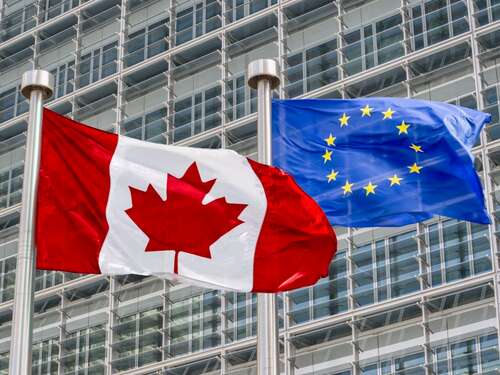
According to the new partnership, the EU and Canada will collaborate on addressing issues in areas such as AI, quantum and semiconductors.
The European Union and Canada have announced their intentions to boost their strategic digital partnership to address “new challenges in digital transformation”.
In a joint press release published yesterday (1 February), the two regions outlined their plan to increase cooperation and address challenges in the areas of AI, quantum science, semiconductors, public policy related to online platforms, secure international connectivity, cybersecurity and digital identity.
The plan, which was achieved through a virtual meeting between EU commissioner for internal market Thierry Breton and Canada’s minister of innovation, science and industry François-Philippe Champagne, is a result of a digital partnership agreed between the regions at the 19th EU-Canada summit, held last November in St John’s, Canada.
Summary of aims
In terms of AI, the EU and Canada intend to establish regular channels of communication and exchange information through workshops covering topics such as AI governance and international standards.
For quantum science, the regions intend to expand “mutually beneficial collaboration” to improve and accelerate research, development and innovation in the area, while also promoting jobs and the use of quantum tech in the broader economy.
On the subject of semiconductors, the EU and Canada stated their intention to cooperate on addressing “future disruptions” to the semiconductor supply chain through the exploration of monitoring and early warning mechanisms. Information on public support for the sector and workforce development initiatives will also be shared, and the two sides reportedly explored collaboration in the research and development of semiconductor tech.
In relation to public policy for online platforms, the plan outlines continued cooperation and information exchange to ensure transparency, fairness and accountability. The partners’ implementation of their respective policy frameworks will then be shared with one another “in the coming year”. This subject is particularly topical, as various social media companies were recently grilled by the US Senate over allegations of failing to appropriately uphold child safety on their platforms.
The regions also intend to collaborate on the implementation of cybersecurity frameworks to provide protection for areas such as critical infrastructure and the cybersecurity of products, noting that there is an opportunity to cooperate on certifications and standards. According to the press release, the first step of this initiative will involve the two partners identifying opportunities for information exchange and “best practices in pursuing domestic initiatives”.
To address challenges in secure connectivity, the EU and Canada will share information to “encourage the development of secure and high-quality connectivity”, while also exploring ways of developing such connectivity between Europe, North America and Asia, such as through potential routes in the Arctic or North Atlantic.
Finally, the partners aim to address digital identity challenges through the promotion of interoperability through pilot projects.
The two regions will reportedly convene a “ministerial-level digital partnership council” in the spring to examine progress and decide the next steps of the plan.
Find out how emerging tech trends are transforming tomorrow with our new podcast, Future Human: The Series. Listen now on Spotify, on Apple or wherever you get your podcasts.

